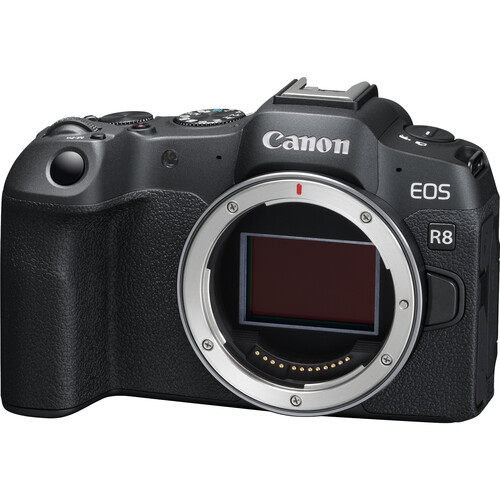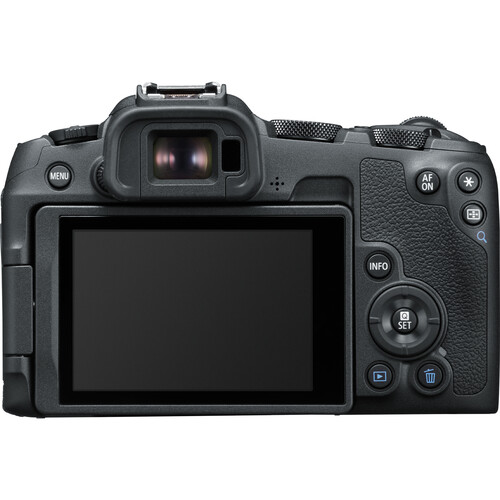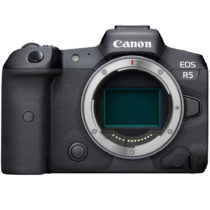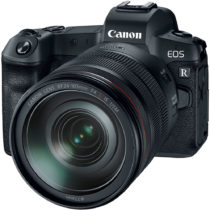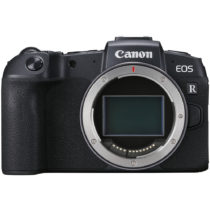Description
24.2MP Full-Frame Sensor and DIGIC X Processing
Pairing a powerful full-frame 24.2MP CMOS sensor and DIGIC X image processor, the R8 delivers high resolution imagery with rich and accurate colors. Designed to work in a variety of lighting condition, this camera offers a flexible ISO 100-102400 range that is expandable to ISO 204800 for working in difficult lighting conditions. Using the full width of the sensor, 6K oversampled UHD 4K 60p video recording is supported as is Full HD 1080 180p for slow motion playback. The R8 offers 4:2:2 10-bit shooting and up to 2-hours of video recording is now available at 29.97 fps, allowing you to keep your project rolling. Capable of processing high speed bursts, the DIGIC X image processor also supports up to 40 fps continuous shooting and offers pre-shooting support, which allows the camera to start recording images 0.5 seconds prior to pressing the shutter release button.
Dual Pixel CMOS AF II
Featuring 1053 automatic AF points that cover the entire sensor area, the advanced Dual Pixel CMOS AF II system provides extremely fast and accurate focusing performance. This phase-detection focusing system offers enhanced subject detection and tracking, with the ability to intelligently recognize people, animals, and vehicles while automatically locking onto these subjects and maintaining sharp focus throughout burst and video captures. Additionally, this autofocus system’s low-luminance limit focuses down to an impressive -6.5 EV for accurate focusing in dark conditions.
HDR PQ and Canon Log 3
Though the EOS R8 camera can record impressive video straight out of camera, content creators looking to take the next step in their imaging journey have the choice of two powerful video recording options in HDR PQ or Canon Log 3 video recording. With HDR PQ recording a 10-bit color file is recorded that does not require additional editing. This 10-bit HDR file is compatible with HDR displays such as TVs, monitors, and smartphones, which display your video with even more color accuracy and dynamic range than standard displays. For creators who like to edit their video files, Canon Log 3 is also available, creating a 10-bit log file which allows for powerful recovery of highlights and shadows as well as creative color grading capability.
Vertical Movie Mode and Aspect Markers
Movie rotation information can be set during or after movie recording, allowing videos to be played in vertical composition when viewing on a smartphone. The Aspect Markers function displays visual markers for different aspect ratios that may be desired for posting the same file to various social media sites. This display provides consideration for proper composition for the different deliverable files that can be created when editing.
Livestreaming
UVC/UAC compatibility allows the R8 to be used as a web camera to stream live video in Full HD, without additional computer software, to applications such as Zoom, Microsoft Teams, Skype, and similar video conferencing software. Thanks to the full-frame image sensor, you’ll be able to have versatility in your exposure, as well as strong background separation when using bright aperture lenses for video conferencing or livestreaming content.
Movie Digital IS
Record stable videos efficiently with minimum equipment, even when shooting handheld, with Movie Digital IS 5-axis image stabilization. Camera-shake vibrations are reduced even more through coordinated control of Movie Digital IS when using a RF lens featuring optical image stabilization.
2.36m-Dot EVF and Vari-Angle Touchscreen LCD
Providing high-resolution eye-level viewing, the R8 is designed with a bright and clear 2.36m-dot OLED EVF for a pleasing electronic viewfinder experience. The EVF supports up to a 120 fps refresh rate and has been designed to provide a bright, sharp, and colorful 100% view of the subject at hand.
Additionally, a large 3.0″ 1.62m-dot vari-angle touchscreen makes it easy to compose and shoot from virtually any angle. With touch and drag functionality, you can intuitively and swiftly move the autofocus point on the touch-panel LCD.
Flexible Connectivity
- Wired and wireless connectivity options allow for multiple methods of transferring photos and videos, livestreaming, as well as for remotely controlling the camera. Physically, the camera features a remote port, a USB-C port, a micro-HDMI port, a microphone input, and a headphone jack for monitoring sound.
- Built-in Bluetooth pairing lets you easily connect the camera to compatible smart devices using the free Canon Camera Connect app. This low-energy wireless connection helps preserve battery life, while providing remote control of the camera. It also sends continuously updated GPS location data from your phone, letting you geotag what you’ve captured so you know precisely where you captured the photo.
- Built-in Wi-Fi connectivity enables wireless functions, such as remote live view, file viewing, and transfer, by connecting to Wi-Fi quickly and seamlessly. Using the Canon Camera Connect app, you can also transfer files to your mobile device to browse and share on social media.
- Built-in USB-C allows you to connect the camera to a smartphone or computer. All Canon Camera Connect app features that can be used with Wi-Fi are now available when the camera and smartphone are connected via USB, using a compatible cable for your device.
Next-Generation Multi-Function Shoe
An update to a conventional hot shoe, the Multi-Function Shoe adds a row of pins at the front of the design to permit greater accessory functionality as well as provide power to select accessory types that traditionally rely on separate batteries.

